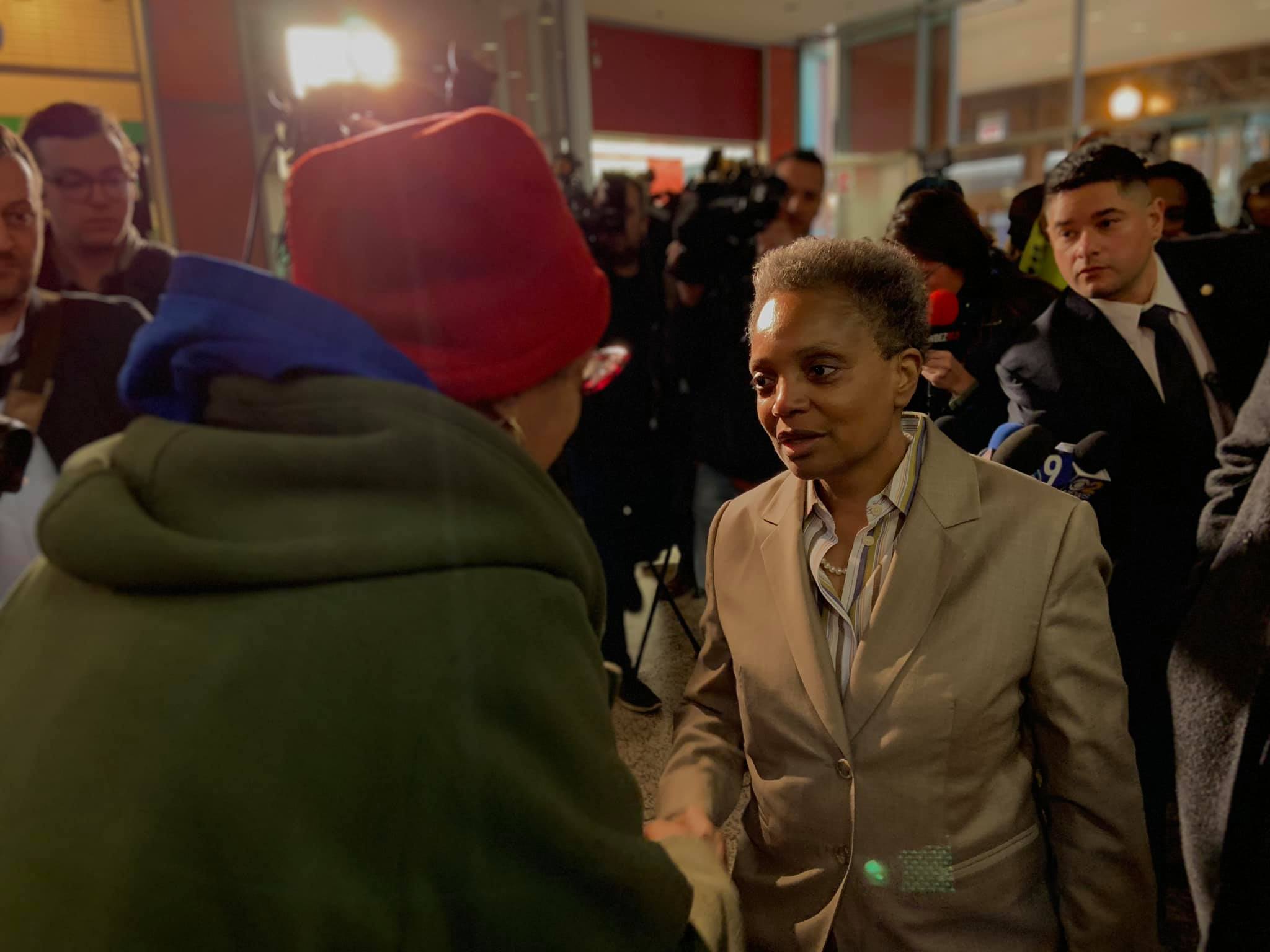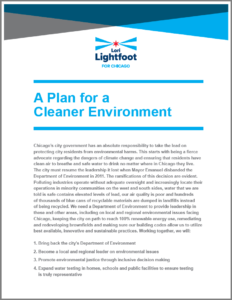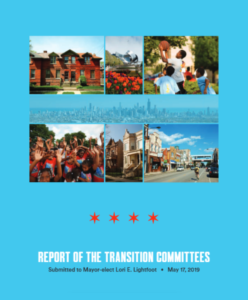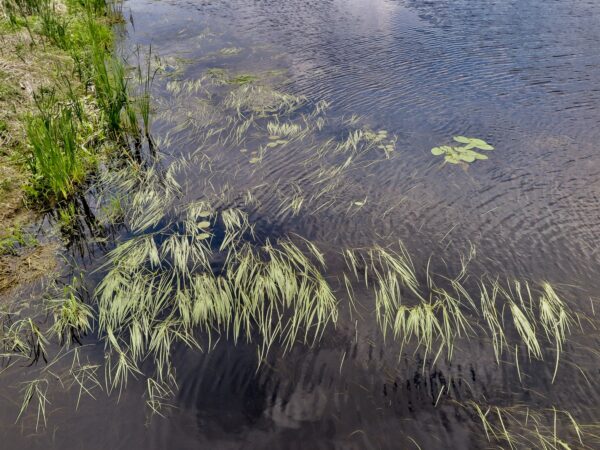
Chicago’s new mayor started just this week, and one of the issues on her radar is access to water for all citizens.

Chicago Mayor Lori Lightfoot, Photo by @LightfootforChicago via facebook.com
“Water is a basic human right,” Mayor Lori Lightfoot said a few days before her inauguration, the Chicago Sun Times reported. “And when you cut somebody off from water, you’re effectively evicting them and putting them on the street. We will not do that in the city.”
Lightfoot called water shutoffs “heartless” and directed Chicago’s water commissioner in a phone call to end them, following a recommendation from her transition team.
The transition team also recommended that water service to disconnected homes should be restored in Lightfoot’s administration’s first hundred days and to “initiate progressive water rates likely starting with a study.” The team did not recommend a detailed rate plan. In general, progressive rates mean those with less ability to pay would be charged a lower rate.
Water rates tripled in Chicago between 2007 and 2018 according to an American Public Media February report, making them unaffordable for many in economically disadvantaged areas.
Rates also increased “alarmingly fast” in Cleveland, Milwaukee, Detroit, Buffalo and Duluth with shutoffs disproportionately impacting poor African-American and Latino neighborhoods, the report stated. But few elected officials at any level have addressed what the report called a “growing crisis.”
“I’m elated to hear that Mayor Lightfoot has taken a bold stance on shutoffs,” Detroit water rights activist Monica Lewis-Patrick told Great Lakes Now.
But Lewis-Patrick said there’s more beyond banning shutoffs Lightfoot can do.
She recommended that Lightfoot “shape her water policy with water affordability” in mind and support a “Water-For-All Ordinance” that has been circulating and is geared toward affordability. If passed, the ordinance would also require that privatization of Chicago’s water system be approved by voters.
Leadership in the Great Lakes
Water access and affordability aren’t the only water-based concerns brought to Lightfoot’s attention in the transition report.
The report called for the administration to “(resume) leadership in Great Lakes issues” such as climate resilience, restorative infrastructure and aquatic invasive species.
In January, Lightfoot announced a nine-point environmental policy as part of her campaign. The policy included bringing back the Department of Environment that was disbanded in 2011 by former Mayor Rahm Emanuel.
The policy also mentioned becoming a local and regional leader on environmental issues by actively participating in the Great Lakes and St. Lawrence Cities Initiative.
“Chicago City government has an absolute responsibility to protect Chicagoans from environmental harms,” Lightfoot said in the press release announcing the policy. “This starts with bringing back the Department of Environment to combat climate change and ensure that residents have clean air to breathe and safe water to drink no matter their race, economic status, or zip code.”
The transition report does not mention the Department of Environment, but one of the transition team’s recommendations was the creation of a new agency to coordinate environmental justice initiatives across agencies, “protect residents’ health and ensure equitable access to the city’s natural resources.”
The 232 page transition report submitted to Lightfoot is available online. Environmental issues begin on page 57.
“We are pleased her team has recommended Great Lakes engagement,” said John Dickert, president of the Great Lakes and St. Lawrence Cities Initiative. The Initiative, a group of U.S. and Canadian mayors, was founded by former Chicago and Toronto Mayors Richard M. Daley and David Miller, respectively.
Dickert said the Initiative offered to provide “best practices and efficiency models to the Lightfoot administration to help Chicago’s communities with infrastructure issues like lead pipe replacement.”
An offer of collaboration also came from Cameron Davis, a commissioner on Chicago’s Metropolitan Water Reclamation District (MWRD.)
“The Lightfoot administration has a lot of friends it can lean on for help,” Davis said.
“There’s an active environmental community,” he added, “and we’re eager at MWRD to figure out how together the city and region can deliver greater impact more effectively for all of their residents.”
Davis speaks with municipal transition experience.
While he worked on Great Lakes issues in the Obama EPA, Davis served on the transition team that advised former Chicago Mayor Rahm Emanuel when he first took office in 2011.
Proactive, not reactive
The city’s response to the environmental concerns of Chicago’s neighborhoods has been focused on reacting to citizen concerns, according to the report.
Trust needs to be rebuilt with the city being proactive when crafting and enforcing regulations and issuing permits, the report said.
In a section of the transition report titled Equitable Environment Enforcement, Lightfoot’s transition team said Chicago struggles to meet clean air and water regulations, leading to a “polarized” relationship between communities that border manufacturing areas and the industries in those areas.
“Environmental justice concerns should be baked into zoning, permitting and land use planning processes,” transition team member Josh Mogerman told Great Lakes Now. “That hasn’t always been the case.”
Mogerman is the Natural Resources Defense Council’s national media director, based in Chicago.
NRDC has actively assisted citizen groups in Chicago’s industrialized Southeast Side grappling with airborne pollutants like petroleum coke and manganese dust.
For more information on air pollution in Chicago’s Southeast Side go to this 2018 Great Lakes Now report.
Featured Image: Chicago Mayor Lori Lightfoot meeting a citizen, Photo by @LightfootforChicago via facebook.com






